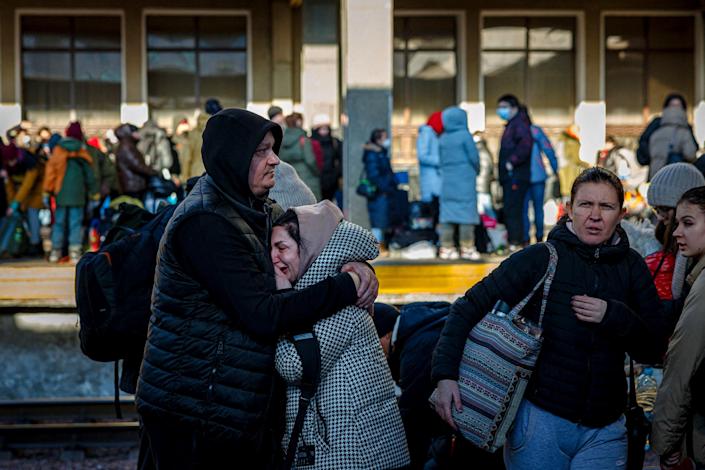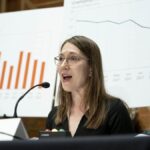More than 2 million people had fled Ukraine as of Wednesday in what could soon become Europe’s biggest refugee crisis of the 21st century, and the worst since World War II. A spokesperson for UNICEF told NBC News that at least half of them are children, some of whom have been forced to travel on their own.
The U.N.’s refugee agency, UNHCR, welcomed a decision last week by the European Union to offer temporary protection to Ukrainians and third-country nationals who have refugee or permanent residence status in Ukraine, offering them “immediate protection.”
While the bloc and countries neighboring Ukraine have received praise, however, other nations are being accused of falling behind, particularly Britain after it acknowledged issuing just 300 visas to Ukrainians so far in response to the crisis.
‘Painfully slow’
The U.K., which left the E.U. in 2020 to much fanfare, issued the visas under a program for refugees with family links to the country, a spokesman for the Home Office, the agency in charge of immigration, told NBC News on Tuesday.
“We stand shoulder-to-shoulder with the people from Ukraine,” said the spokesman, Patrick Dwyer-Cummins.


He said that since last Friday, the Home Office had received a total of 8,900 applications under the program, with appointments made at visa application centers for nearly half of those cases and 340 undergoing security checks.
The government’s Ukraine Family Scheme “will help tens of thousands of people to join their family members in the U.K.,” Dwyer-Cummins said.
However, immigration advocates have said that the British government should be waiving the program altogether and allowing Ukrainians to seek refuge in the U.K. regardless of whether they have family connections to Britain.
With Moldova already accepting more than 82,000 people fleeing Ukraine, Sceats, of the refugee charity, condemned the U.K. for “insisting on these visa-based schemes,” branding its efforts a “cruel farce.”
Sceats said that “the whole point” of the 1951 Refugee Convention, a U.N. treaty that established protections for refugees, “was to put a stop to these kinds of barriers and to establish the principle that if you’re fleeing for your life … you are allowed to turn up and claim asylum on arrival,” she said.
Concerns raised in Calais
So far, the majority of those fleeing have crossed into countries neighboring Ukraine like Poland, Hungary, Moldova, Slovakia and Romania, while thousands of others have made their way to countries farther afield, including Germany, France and Ireland.
With France already locked in an ongoing dispute with Britain over the country’s migration policies, French Interior Minister Gérald Darmanin accused the British government of showing a “lack of humanity” after he said dozens of Ukrainian refugees were turned away at Calais border crossings and told to visit visa offices outside of the port city, the British newspaper The Guardian reported on Sunday.
British Home Secretary Priti Patel denied the French minister’s account, telling the media: “Let me just correct what has been said by the French government. The British government is not turning anybody around or turning anybody back at all.”
Clare Moseley, founder of the refugee charity Care4Calais, which supports refugees and asylum-seekers in Calais, said it was true that those seeking entry into the U.K. were being turned away. She said her team had been helping Ukrainians with their visa applications, but said many were struggling to book visa application appointments online.
The U.K.’s handling of the situation was “not really a surprise,” Moseley said. “This is more generous than their normal approach.”
In addition to the U.K.’s handling of the situation, immigration advocates also took aim at the British government for trying to usher in new rules under the proposed Nationality and Borders Bill, that would criminalize asylum-seekers who reach the U.K. through nongovernment sanctioned routes, including crossing the English Channel via small boats.


“What they’re trying to do is do the minimum they can to help Ukrainian refugees without changing this cold (measure),” Sceats told NBC News in an interview last week.
The fate of the borders bill remains unclear, however, with the clause outlining the contentious rule being rejected by Britain’s House of Lords last week after facing widespread condemnation, including from the UNHCR. The change will go back to the U.K.’s House of Commons and then the government of Prime Minister Boris Johnson can either accept the changes or challenge them.
Criticism of the bill comes as the Home Office faces scrutiny over what immigration advocates say is an increasingly hard-line approach to immigration.
Asked to respond to the criticisms of the bill, a Home Office spokesperson pointed NBC News to past comments from Patel about the U.K.’s efforts to assist Ukrainians.
U.S. urged to do more
As Britain faces backlash over its response to the refugee crisis in Ukraine, the United States is also facing calls to ramp up its response.
On Friday, The Washington Post’s editorial board issued a call for President Joe Biden to commit to accepting “tens of thousands of Ukrainians” to help ease the situation at Ukraine’s borders.
It said that while the U.S. had already taken important steps to help Ukrainians, including offering temporary protected status to those already in the U.S. on business, tourism or student visas, there was still more to be done.
“The president can do this on his own, without Congress. This is yet another way to truly stand with the brave and industrious Ukrainian people and our allies around the world. It would also provide more workers for the U.S. economy,” the editorial board said.
Moldovan Prime Minister Natalia Gavrilita also called on the U.S. on Sunday to increase its humanitarian assistance as the number of refugees arriving in her country from Ukraine climbed into the tens of thousands.


Gavrilita made the comments before a meeting with Secretary of State Antony Blinken, who said Moldova could “count on that support across the board.”
As the war in Ukraine unfolds, the U.N. refugee agency has said that as many as 4 million people could be forced to flee and the international community will be expected to respond.
At the same time, both Moseley and Sceats said it was important that all people fleeing Ukraine be treated equally — and that those seeking refuge from conflict, persecution and disasters in other countries not be forgotten.
Already at Ukrainian borders there have been concerns that not all fleeing the country are being treated equally, with African citizens living in Ukraine reporting racist discrimination and abuse while trying to escape, sparking condemnation from a number of countries, as well as from United Nations bodies.
“Reports that Africans are singled out for unacceptable dissimilar treatment would be shockingly racist and in breach” of international law, African Union officials said in a statement.
Moseley said she had also seen a disparity in Calais over the treatment of Ukrainian refugees compared with those fleeing other countries. Ukrainian nationals, she said, were being hosted in hotels by the local government and given food, while those fleeing other nations, including Syria, Afghanistan and Yemen, were being “left to sleep outside in the freezing cold.”
“They’re not given food. They’re hungry. They’re not even given access to a visa scheme,” she said. “There is a very striking difference in treatment here which is very upsetting for a lot of people.” The Calais government did not immediately respond to a request for comment from NBC News.




